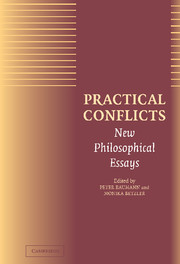Book contents
- Frontmatter
- Contents
- Foreword
- 1 Introduction: Varieties of Practical Conflict and the Scope of Practical Reason
- 2 Willing the Law
- 3 The Myth of Egoism
- 4 Thinking about Conflicts of Desire
- 5 Putting Together Morality and Well-Being
- 6 The Second Worst in Practical Conflict
- 7 Personal Practical Conflicts
- 8 Sources of Practical Conflicts and Reasons for Regret
- 9 Conflicting Values and Conflicting Virtues
- 10 Involvement and Detachment: A Paradox of Practical Reason
- 11 Outcomes of Internal Conflicts in the Sphere of Akrasia and Self-Control
- 12 Are There Insolvable Moral Conflicts?
- 13 Moral Dilemmas of Transitional Justice
- 14 Do Conflicts Make Us Free?
- List of Contributors
- Name Index
- Subject Index
- References
12 - Are There Insolvable Moral Conflicts?
Published online by Cambridge University Press: 02 December 2009
- Frontmatter
- Contents
- Foreword
- 1 Introduction: Varieties of Practical Conflict and the Scope of Practical Reason
- 2 Willing the Law
- 3 The Myth of Egoism
- 4 Thinking about Conflicts of Desire
- 5 Putting Together Morality and Well-Being
- 6 The Second Worst in Practical Conflict
- 7 Personal Practical Conflicts
- 8 Sources of Practical Conflicts and Reasons for Regret
- 9 Conflicting Values and Conflicting Virtues
- 10 Involvement and Detachment: A Paradox of Practical Reason
- 11 Outcomes of Internal Conflicts in the Sphere of Akrasia and Self-Control
- 12 Are There Insolvable Moral Conflicts?
- 13 Moral Dilemmas of Transitional Justice
- 14 Do Conflicts Make Us Free?
- List of Contributors
- Name Index
- Subject Index
- References
Summary
Is there a solution to Bernard Williams's famous Jim/Pedro example? Jim is on a tour through South America and finds himself one day confronted with Pedro, an Army officer, who is about to kill twenty rebellious Indians. Jim cannot prevent Pedro from doing so. But Pedro offers Jim the “privilege” of killing one of the Indians, in return letting the others off. Should Jim accept Pedro's offer? Is there an answer to this question? Is Jim faced with a conflict, but one that can be resolved? Or is this a situation in which we are faced with an insolvable moral conflict, in which different moral demands draw us in different and incompatible directions without an ought being available, that is, a situation where it is even in principle impossible to say what Jim ought to do, all things considered? It is not that we are not able to determine what we ought to do; it is rather that there is nothing that could be discovered as something that ought to be done.
According to what Alan Donagan calls moral rationalism, this cannot be the case. Moral theories cannot allow for moral dilemmas. A moral theory that would do so would have to be revised. As Donagan puts it: “The generation of moral dilemmas is to moral rationalism what the generation of self-contradictions is to theories generally: an indispensable sign that a particular theory is defective.
- Type
- Chapter
- Information
- Practical ConflictsNew Philosophical Essays, pp. 279 - 294Publisher: Cambridge University PressPrint publication year: 2004

